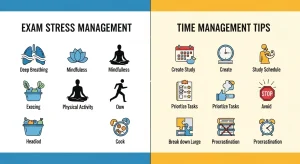In today’s fast-paced world, many people struggle with how to reduce stress and anxiety. Between work, family obligations, and constant digital distractions, it’s easy to feel overwhelmed. The good news is there are natural ways to manage stress and anxiety effectively — and you don’t need expensive therapy or medications to start.
In this blog, you’ll discover powerful techniques that are simple, effective, and backed by research. Whether you’re looking for daily stress relief tips or long-term lifestyle changes, this guide will help you feel more calm, centered, and in control.
Easy & Healthy Recipes for Busy People
Why It’s Important to Manage Stress and Anxiety
Chronic stress can take a serious toll on your physical and mental health. It can lead to:
-
Sleep problems
-
High blood pressure
-
Weakened immune system
-
Mood swings and depression
-
Digestive issues
Learning how to manage stress and anxiety is essential for a healthier, happier life.
1. Practice Mindful Breathing
Mindful breathing is one of the simplest and most powerful ways to reduce anxiety quickly.
How to do it:
-
Sit or lie down in a quiet space.
-
Inhale slowly for 4 seconds, hold for 4 seconds, exhale for 4 seconds.
-
Repeat for 3-5 minutes daily.
Mindful breathing activates the parasympathetic nervous system, helping your body enter a relaxed state.
How to Speak English Fluently: Simple Tips That Actually Work
2. Get Regular Physical Activity
Exercise is a natural stress reliever. It boosts endorphins, which are your brain’s feel-good chemicals.
Examples of effective exercises:
-
Walking or jogging
-
Yoga or Pilates
-
Swimming
-
Cycling
Even a 20-minute walk can significantly reduce stress and anxiety levels.
3. Limit Caffeine and Sugar Intake
Excessive caffeine and refined sugar can worsen anxiety symptoms. Try replacing coffee with herbal tea, and opt for natural sweeteners like honey or dates.
Better options include:
-
Chamomile tea
-
Ashwagandha supplements
-
Warm lemon water in the morning
How to Make Money Online: Proven Ways to Earn in 2026
4. Try Meditation or Mindfulness Techniques
Meditation helps you stay grounded and less reactive to stressors.
Apps to try:
-
Headspace
-
Calm
-
Insight Timer
Practicing just 10 minutes of mindfulness meditation daily can improve your mental clarity and reduce anxiety naturally.
5. Improve Sleep Quality
Poor sleep increases cortisol (the stress hormone). Aim for 7–8 hours of restful sleep.
Tips for better sleep:
-
Avoid screens 1 hour before bed
-
Create a bedtime routine
-
Use calming scents like lavender
-
Sleep in a dark, quiet room
Top 10 Superfoods That Boost Your Immune System
6. Connect With Others
Don’t isolate yourself. Social support is a key factor in emotional resilience.
-
Talk to friends or family
-
Join a hobby group
-
Consider therapy or counseling
Being around others can boost serotonin levels and help reduce stress naturally.
7. Eat a Balanced Diet
What you eat affects how you feel. Choose nutrient-rich foods that support brain function.
Best foods to reduce stress:
-
Leafy greens (spinach, kale)
-
Fatty fish (salmon, sardines)
-
Berries and citrus fruits
-
Nuts and seeds
-
Whole grains
Avoid processed foods and opt for meals that fuel both body and mind.
Best Weekend Trips from London
8. Use Aromatherapy
Scents like lavender, eucalyptus, and peppermint can relax the nervous system.
How to use:
-
Add essential oils to a diffuser
-
Use scented candles
-
Add a few drops to your pillow before bed
Aromatherapy is a quick, non-invasive way to relieve anxiety throughout the day.
Simple Daily Routine for Reducing Stress
| Time | Activity |
|---|---|
| Morning | Deep breathing + stretching |
| Afternoon | Light walk or quick meditation |
| Evening | Herbal tea + gratitude journaling |
| Night | Digital detox + calming music |
FAQ – Frequently Asked Questions
1. What is the fastest way to reduce anxiety naturally?
Mindful breathing and short walks are the quickest techniques. Deep breathing reduces cortisol within minutes.
2. Can diet really affect stress levels?
Yes. A balanced diet rich in omega-3s, magnesium, and B vitamins can significantly improve mood and stress response.
3. How long does it take to see results from stress-reducing habits?
With consistency, you may begin noticing improvements within a week. Full benefits often appear after 3–4 weeks.











